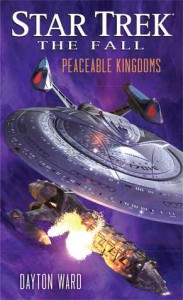
Star Trek: The Fall: Peaceable Kingdoms by Dayton Ward

This is the conclusion of the "The Fall"-miniseries. And come to think of the series as a whole, I still question the decision why the parts aren't numbered on the cover. Especially here, it's an illusion to maintain the statement that every single part can be read on its own without prior knowledge - yeah, that may apply to "Shadow" (and Revelations since it's the first part), but to the others (especially Chalice and Kingdoms) not so much. So why not be upfront about it and put the reading order on the covers?
But back to this novel:
While it brought the series to an ultimately satisfying (if a bit predictable) conclusion, the only really engaging parts where the flashbacks and the introduction of the Cardassian doctor. Everything else (Enterprise being redirected, Starfleet ships pitched against each other, last minute-rescues etc) felt a bit repetitive after the other parts of the series. "Ishan"'s story was an interesting one, it shed light on the occupation, its cruelty in exploiting Bajor and the Bajorans, and it highlights its last days, the sort of burned earth-policy the Cardassians employed. But to be honest, I didn't quite understand the reason for the identity change in the first place since the Cardassians don't change Baras' features to match the original Ishan's and kill all those who could identify Baras (and the late Ishan) anyway. So while the actual twist worked well, the reason behind it seemed contrived and that wasn't really explored all that well. But then again, I thought it would go in a sort of Iliana Ghemor/Kira Nerys-direction...
I also liked the way that exploration should be back on Starfleet's agenda after all the political upheaval. That's what has been missing since well before the Relaunch-novels, as the 9 part series "A time to" that came before Nemesis also dealt with political upheaval and conspiracies on the highest level. So it's time to go "where no one has gone before" again.
Otherwise the novel spent pages upon pages repeating itself (and its predecessors) which let my attention wander a bit - never a good sign. I observed the need to endlessly summarize previous chapters in quite a few ST-novels (David R George is another author who employs that manner of story telling...) now, and I wonder why that is necessary as I don't think the readers are incapable of retaining the memory of what they've just read. Fortunately, the action picked up speed in the second half of the novel, but during the first half it was a real chore to wade through those repetitions. I think much of the space used for those "summaries" could have been used exploring the aftermath, Ishan's removal, Bajor's reaction, the actual election (even if the election of the Andorian candidate was a foregone conclusion), even the race to get the information back to Earth/Louvois. Riker's end of the story, his confronting Schlosser, even the part where they got Velk out, all that got awfully short-changed. Why not show the actual events instead of just mentioning them in a conversation after the facts?
So, overall this is a rather average novel - it was an entertaining story, but it could and should have been more.















